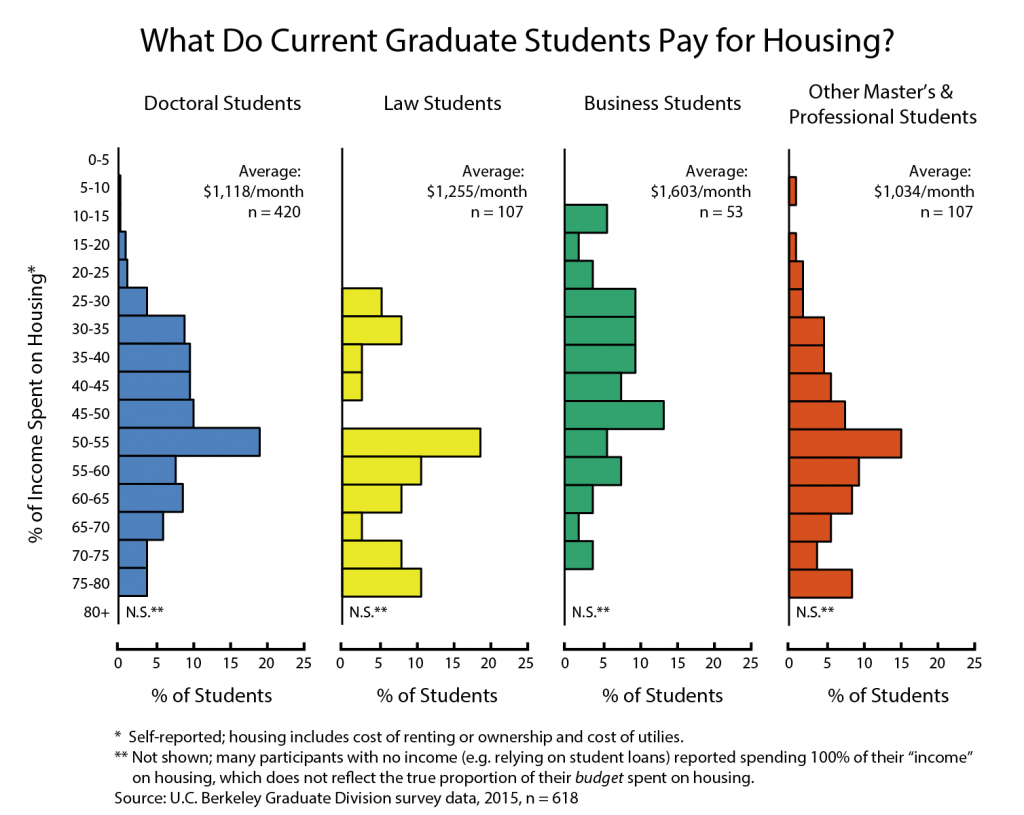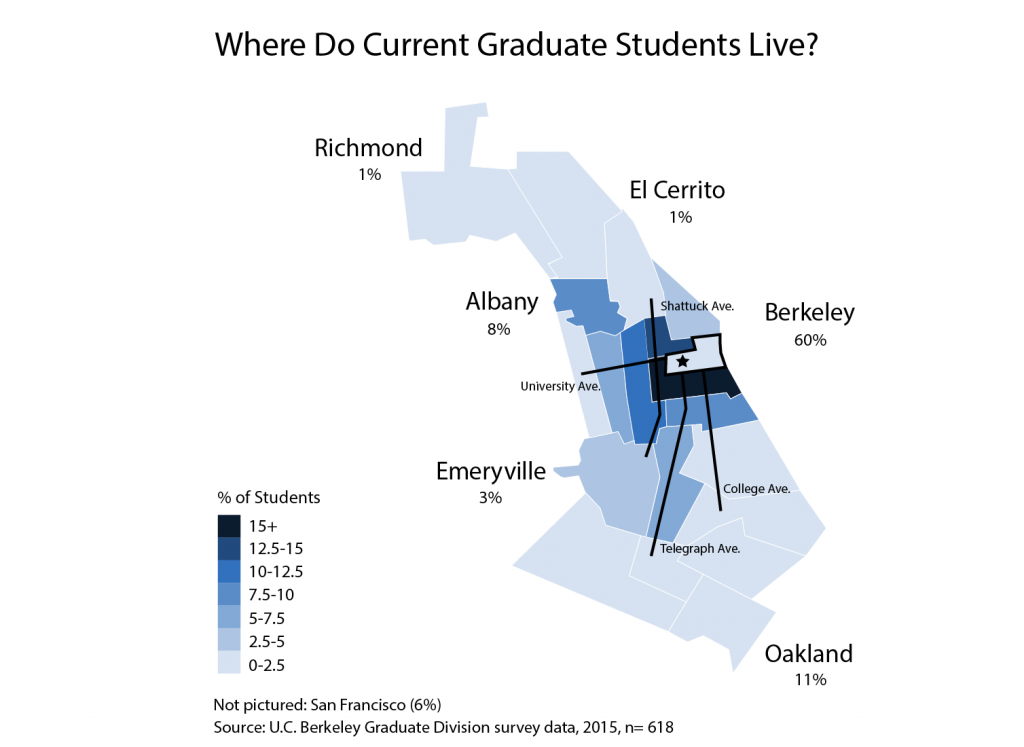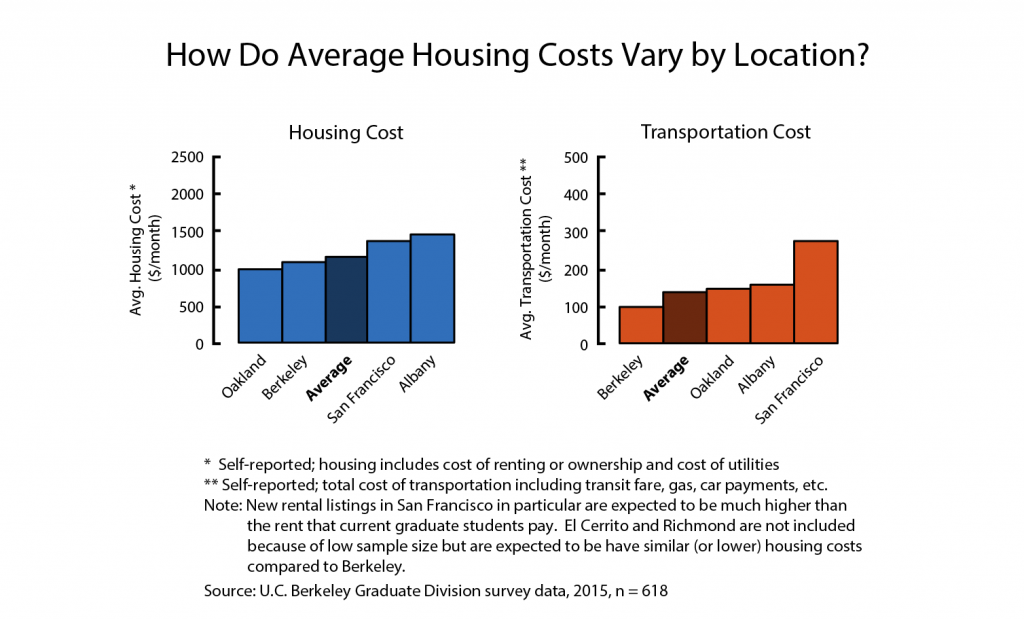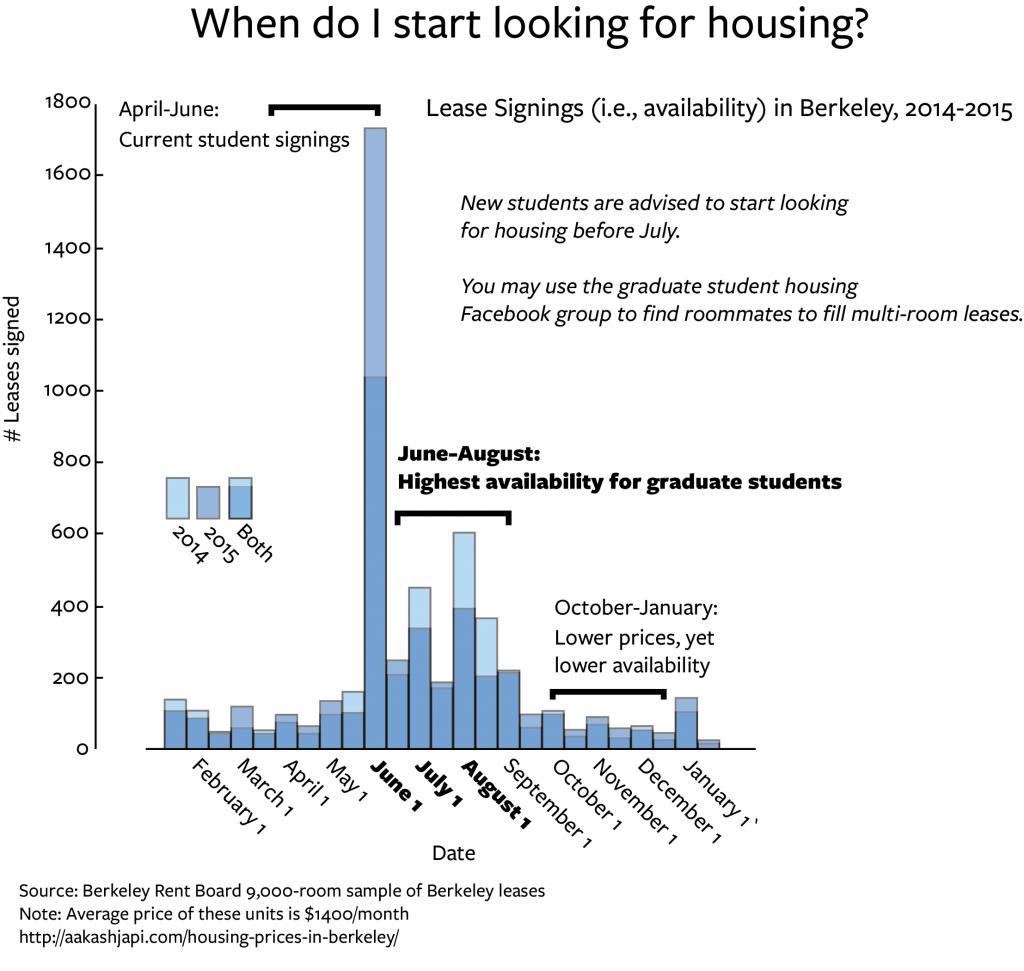Housing Resources for UC Berkeley Graduate Students
Last updated October 13, 2023
- Graduate Campus Housing: xučyun ruwway Graduate Student Apartments, Ida Jackson House, Intersection, Manville, and University Village (Family Student Housing)
- More information is available on the Graduate Student Campus Housing website
- University Village residents have access to recreation programs and family resources
- Off campus options
- Housing Security Deposit Award helps enrolled students who need assistance in paying security deposits to obtain safe, secure, and stable housing
- Emergency Rental Assistance: one-time rental assistance for those with emergency needs
- Emergency Housing: temporary housing for those facing imminent loss of housing or currently unhoused
- NIH Re-entry Supplement: for graduate students working in NIH funded labs, the NIH offers a noncompetitive supplement to promote re-entry of parents to research after a period of taking time of for childcare and other family responsibilities.
GA Housing Guide
Students at UC Berkeley enjoy the opportunity to live among the interesting cities, natural parks, and abundant job opportunities of the Bay Area while experiencing the support of a vibrant graduate student community. A challenge many students face, however, is the high cost of housing that accompanies such a desirable location.
This guide hopes to help students, particularly graduate students, make the most of their time here by providing authoritative advice on how to navigate the local rental market on a student budget. After reading this guide, you should be able to understand the nature of the local housing market, determine what you can afford, acquire as cheap of housing as possible, retain your housing, and get involved to limit the effects of rising rents on local and university communities.
This page discusses some frequently asked housing questions:
- What is the housing market like near U.C. Berkeley?
- What housing is affordable for me?
- How can I find affordable housing?
- How can I keep affordable housing?
- How can I help other people deal with the effects of the housing crisis?
What is the housing market like near U.C. Berkeley?
Obtaining affordable housing in Berkeley may seem like a challenge. The average cost of available rental units in Berkeley has been steadily rising for several years and may continue to rise for some years to come. In fact, the entire Bay Area region is experiencing what’s been called a “housing crisis,” with affordable units becoming less available or more expensive in San Francisco, Oakland, El Cerrito, Richmond, and Albany, among other cities.
“Housing crisis” refers to a rate of rent and housing cost growth that makes living in the Bay Area prohibitively expensive for many residents. The current housing crisis is actually the second housing crisis the region has experienced in the last several decades, the other being the “Dot-Com” boom in the late 1990’s.
The causes of the current housing crisis are many, but the fundamental cause is that population growth has outpaced housing growth. Part of the shift is generational: more people are choosing to live in cities than previous generations, and cities around the country are experiencing growth in housing costs as a result. But the economic strength of the Bay Area has lead to a particularly strong growth of highly paid workers who, for now, can afford higher rent and home prices. Compounding the effects of population growth is the lack of commensurate housing development, caused by physical constraints such as elevation, water, and earthquakes; the lack of an authority to enforce regional development; and inadequate political will, at all levels of government, to enact solutions.
A housing crisis leads to higher costs for everyone, but low income residents are acutely affected. Tenants in rent-controlled units are evicted to make way for new tenants or development that provide greater revenue. Neighborhoods change and property values rise, displacing long-term residents. And with fewer places available to live, the mobility of low-income residents, including students, is decreased.
What housing is affordable for me?
Various sources estimate that for housing to be affordable for you, the cost of the housing and utilities should not exceed 30-50% of your income. Due to the realities of the housing market, most students will not be able to avoid paying more than this amount. On average, current graduate students at Berkeley have been estimated to pay 50% of their income per month on rent and 13% per month on transportation. The proportion of monthly budget dedicated to housing varies between students because of differences in funding levels and housing costs and location.

Regardless of income, students should acknowledge that more expensive housing costs lead to less financial stability through the accumulation of debt or a decrease in discretionary income. Financial management is a tool students can use to compensate for the tighter budget imposed by increasing housing costs. Here are some steps graduate students can take to improve their finances:
- Actively monitor your income and specific expenses to identify unnecessary expenses.
- Consider deferring student loan payments if you are eligible to do so.
- Obtain a class pass for free ridership on AC Transit. (Not available for Muni or BART).
- Review how health expenses are priced in the Student Health Insurance Plan.
- Apply for additional funding through grants and fellowships if it can increase your income.
- Whenever possible, reuse items or buy used items from local stores and online sites.
- Prepare your own meals instead of eating expensive restaurant meals.
- If you ever need help paying for food, consult Financial Aid’s Food Resources and the Berkeley Food Pantry for emergency food relief.
- Despite high cost of living, attempt to save as much as 20% of your income to buffer against unforeseeable costs or joblessness.
- Pay off the balance on your credit cards each and every month to prevent the accumulation of debt and to maintain a good credit score.
- For tax document preparation, consult the ASUC Student Legal Clinic for free assistance.
- The university offers a short-term emergency loan that can be useful, for example when moving from one rental unit to another. The loan is interest-free, automatically approved for first requests under $1,000, and might be approved over $1,000 (in-person appointment suggested). CAUTION: If you cannot repay the loan within 60 days, you financial aid is stopped until the loan is repaid.
In general, managing your finances may seem challenging, but like any other skill you can develop it through practice. You may consider using services that help you manage your finances, like Mint.com, but be aware that these services will either cost money or collect your information for profit.
Although you might feel pressured to save money whenever possible, your physical and emotional health should be your first priority. Please refer to our Graduate Student Wellness Guide for resources on keeping healthy during graduate school.
How can I find affordable housing?
You can improve your chances in obtaining more-affordable housing by knowing what resources are available to you, conducting a thorough search, and being aware of your rights and responsibilities as a tenant.
Resources for finding housing
- Visit the Berkeley Graduate Division’s article, “Tips for Finding Housing in Berkeley,” the Daily Cal’s housing issue, and CalRentals’ tips and resources to learn about what housing options and services are available for students. We will highlight three unique resources for students to acquire housing:
- CalRentals is a university-provided service that contains off-campus rental listings for students (free), faculty, staff, and UC Berkeley affiliates. Some listings on CalRentals will not appear on public rental-listing sites such as Craigslist and vice versa. The site also includes a useful housing resources guide.
- The Berkeley Student Cooperative is a non-profit cooperative organization with 20 properties in Berkeley near campus that emphasize the community living experience. The units are only available to students, and costs are about a third of market rates.
- University Village is a housing community for families in Albany. The units are only available to UC Berkeley affiliates, and costs are generally 15% lower than market rates.
Graduate students often live further away from campus than undergraduate students do. Many choose to live in west and north Berkeley, Albany, and north Oakland, and some find south Berkeley, the area with the most undergraduates, to be too busy. Some students live in El Cerrito, Richmond, and other parts of Oakland where costs are somewhat lower but commuting may be more challenging. Depending on elevation, walking is feasible within two miles of your place of work, but beyond that distance many students choose to drive, bike, or take public transit. These options expand the possible distance from campus that you can live. Review the AC Transit bus map and schedules to determine if there is a bus that regularly connects the housing location to Berkeley. Bay Area Rapid Transit (BART) also connects many cities in the Bay Area, but unlike AC Transit, the university does not provide free ridership. Options also exist travel between UC Davis and UC Berkeley on the BerkBus shuttle.


The housing search
Almost all lease agreements require a meeting with the unit’s owner, proof of income, and a security deposit, and many lease agreements require credit reports (not simply credit scores). The security deposit provides funding to repair damage that might occur during your tenancy and can be up to two months’ rent for unfurnished units and three months’ rent for furnished units.
Some important tips:
- The Berkeley Student Cooperatives have a very long waitlist, sometimes taking over a year to obtain a room. If this option interests you, sign up as soon as possible.
- Be ready to secure low-cost options when they become available on the market by having the required documents and deposits prepared before you begin your housing search.
- In Berkeley, landlords can charge you up to approximately $50 (as of 2015) for a credit report or background check when you submit your application. Because many people may apply to each unit, avoid applying to units with fees unless you have a high likelihood of securing the lease.
- Obtain free credit reports once a year from each of the credit reporting agencies through AnnualCreditReport.com, which is authorized by the federal government. All other sites promising “free” credit reports will charge you in some way or steal financial information.
- Fraud is an uncommon but possible occurrence. It is advisable to only pay for a unit that you have visited in person. If you are working with an agent, verify they are who they say they are and have a license.
- Ask your departmental advisor or any other contacts if they can arrange temporary housing for you (such as with current students) while you perform your housing search. CouchSurfing and AirBnB are other resources for temporary stay.
- Also ask contacts if they know of any housing becoming available soon. Word-of-mouth is a great way to secure housing before it is listed on sites like Craigslist.
- Units allowing pets are rarer and often more expensive.
- Some of the lowest housing costs are found in areas with the highest crime rates; consider the effect of this stress while evaluating the cost of the housing.
Housing arrangements with multiple people are usually less expensive per person. If you are looking for a roommate or housemates:
- Connect with students in other departments using the graduate student-specific and school-wide housing Facebook groups, where students post available rooms or find roommates to look for housing together. Connecting your Facebook account to your @berkeley.edu email address is required to join these groups.
- Ask your department coordinator for contact information of other students if not already provided
- CalRentals provides a roommate search tool
- The Berkeley International Office has a roommate search tool for international students
- Roommates can also be found through online groups such as the LGBTQ Facebook group for graduate students
In general, expect your search for housing to take several weeks. However, be prepared to secure housing at any point in your search, as listings for rental units often close just days after they are posted. According to an analysis of lease signings in the city of Berkeley between 2014 and 2016, the highest availability of housing is between June and August. You are advised to start your search for housing no later than the middle of July.

If you are switching residences in Berkeley, you should know:
- Most lease agreements allow your previous landlord several weeks to inspect the property before returning your security deposit. Save money ahead of a move to pay for the new security deposit or consider taking out an emergency loan from the university (see: What housing is affordable for me?)
- To avoid losing important mail when you move, notify the United States Postal Service of a change of address online.
Rights and responsibilities of renting
We very strongly recommend reviewing your rights and responsibilities as a tenant before searching for housing. Berkeley has stronger tenant protections than most cities, but to keep those protections it is important to know what to expect of your landlord and what he/she expects of you. Taking these steps will help:
- Know your rights as a tenant in Berkeley.
- Read the City of Berkeley’s advice for student tenants.
- Read UC Berkeley’s tips for lease and rental agreements.
- If your current lease is “rent-controlled,” you can check whether or not a rent increase is legally allowed using the Berkeley rent ceiling database.
How can I keep affordable housing?
Should you find yourself subject to an unfair rent increase, eviction, or other disagreement with your landlord, you may choose to seek the aid of counseling services. Several organizations exist to help tenants hoping to keep their housing. It is important that you know your rights and responsibilities as a tenant to help in potential disputes (see: How can I find affordable housing?). This is especially important for rent-controlled units (which are not subject to price increases with the market), as what you do in a dispute could affect the rent-control status of your unit.
The UC Berkeley Student Legal Services “advises currently registered Cal students regarding their legal questions, rights, and obligations.” They also host drop-in counseling hours with the City of Berkeley’s Rent Board, where students can learn more about regulations affecting Berkeley rental units.
Tenants Together is “a nonprofit organization dedicated to defending and advancing the rights of California tenants to safe, decent and affordable housing.” They offer both a tenant rights hotline, as well as a tenant lawyer network.
Causa Justa offers “free tenant counseling and case management for low-income residents of Oakland and San Francisco.”
If you are living in outside Berkeley and experience a rent increase, you may consider consulting these additional services provided by other city governments:
- Oakland housing counseling and rent adjustment information.
- Albany Rent Review Board Feasibility Study page.
- El Cerrito Housing Resources.
- Emeryville Ordinance on Residential Landlord and Tenant Relations.
- Richmond housing counseling.
- San Francisco Housing Resource Guide.
How can I help other people deal with the effects of the housing crisis?
- Share Resources. Send this guide to other students and administrators, and ask that this guide be included in orientation materials for incoming students. You can influence the policy of your department by requesting regular polls on students’ cost of living and, if appropriate, requesting an increase in payment or helpful financial measures should as transportation costs.
- Identify Further Needs. Each department should determine whether or not their students need further help to deal with the housing crisis and, if they cannot provide support themselves, use the data to advocate for support from the campus administration. We’ve created a template survey for departmental staff and student leaders to ask questions about cost of living and basic needs security. Create a copy of the Google Form and use our list of questions as a reference to create your own survey, or share these resources with your department leadership.
- Be Sensitive. The housing crisis does not just affect graduate students, and graduate students tend to have more income that other low-income community members. If you move into a historically low-income community, be aware of how your presence might affect the community and act accordingly.
- Get Involved. The Graduate Assembly previously created a Housing Advocacy Working Group to help students obtain affordable housing through advocacy and education. If you are a student or community member interested in participating, please email businessoffice-ga@berkeley.edu.